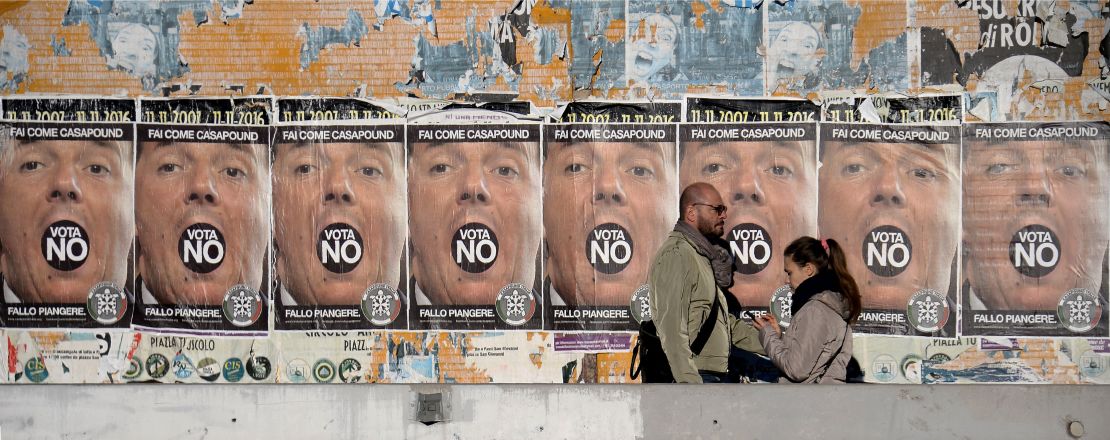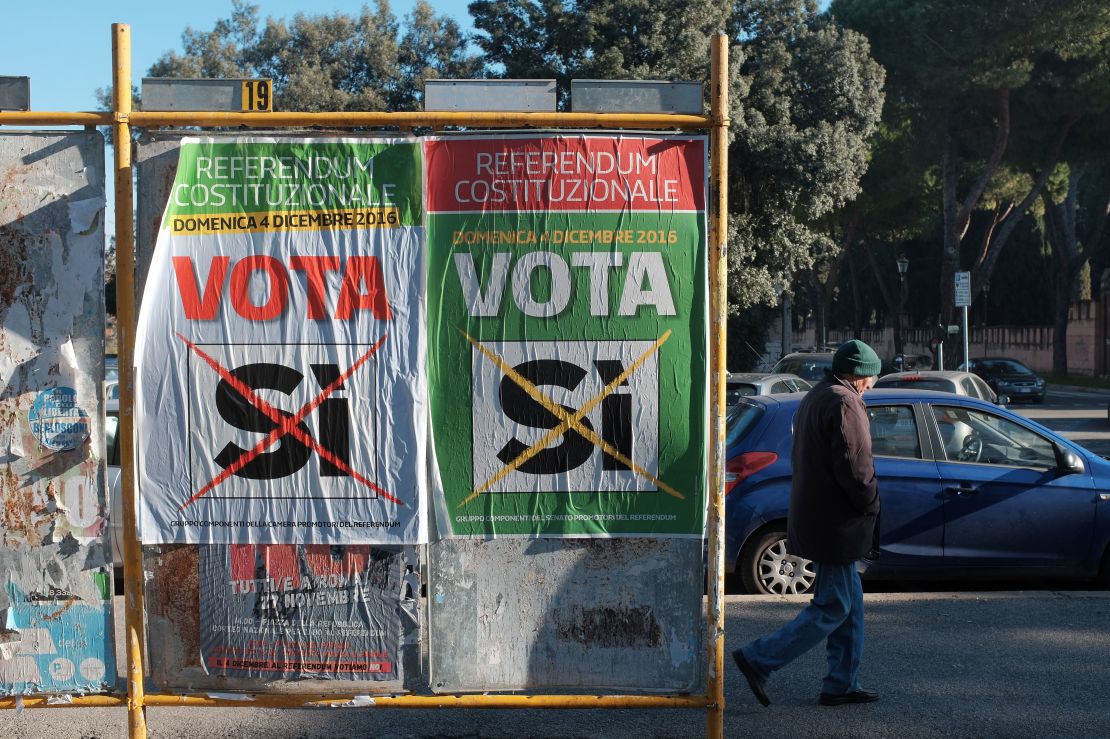Editor’s Note: Ben Wedeman is CNN’s Rome-based senior international correspondent. The opinions expressed in this commentary are his.
Story highlights
Italians prepare to vote in constitutional referendum
Reforms would reduce number of senators in upper house of parliament, making it easier to pass laws
Critics say changes would get rid of an important check on the lower house's power
The world as we know it could come to an end this Sunday. Or it could be just another day. It depends on whom you talk to.
This weekend, Italians go to the polls to vote in a referendum on whether or not the country should amend its 1948 constitution.
The referendum is the brainchild of Matteo Renzi, Italy’s energetic, 41-year-old Prime Minister. His intention is to defang the upper house of the Italian Parliament, the Senato, by cutting its numbers from 315 to 100, thus reducing its powers dramatically, making it more of a consultative assembly.
Yes, if you read to the end of the previous paragraph, you’ll probably agree it sounds dull as dust. But, in the eyes of some, the consequences of a “No” vote could be catastrophic.
Proponents of the referendum say that the goal is to make the job of governing Italy less complicated. By allowing the cabinet to push through legislation in a reasonable time frame, Italy would become more efficient, productive and prosperous while simultaneously becoming less bureaucratic and bound up in red tape.
Italian politics is a noisy, messy, never-ending game of musical chairs, with plenty of motion but little forward movement. The once humming economy is anemic: according to one study, incomes for 97% of Italians haven’t gone up in a decade. The country’s GDP hasn’t really budged since the late 1990s.
Some opponents say that the proposed reforms don’t go far enough, while others fear that a weakened Senate will eliminate an important check on power.
READ MORE: Italy’s referendum a nightmare for Europe
Great wall of red tape
Regardless of where Italians stand on the upcoming referendum, few here believe all is well.
“Foreigners think life in Italy is like walking on water,” an Italian woman in Rome recently told me over dinner. “But we are really dragging ourselves through a swamp.”
Disclaimer: the Italian woman mentioned above is my wife of 32 years. Italy for me isn’t just another posting. It’s been an integral part of my life since the early 1980s. I’m roughly fluent in Italian, my children are all dual citizens and, for better or for worse, Italy is home.

If “No” does win, the worry is that it will send all the wrong signals to foreign investors and financial markets:
First, that Italy is simply unwilling to reform and to tear down its great wall of red tape.
Second, if the referendum fails and Prime Minister Renzi makes good on his vow to resign, Italy will plunge headlong into a period of political instability.
Many Italian banks already teetering on the edge of bankruptcy could come crashing down, leading to a domino effect that will spread to the rest of Europe.
READ MORE: Italian banks drowning in bad debt
End of the European dream?
If Renzi does step down, others could come to power through early elections – including, possibly, the loud- and foul-mouthed comedian-turned-politician Beppe Grillo and his Five Star Movement.
Grillo, much like Donald Trump, has capitalized on widespread disaffection with the status quo. His movement, founded in 2009, now appears to garner almost as much support as Renzi’s center-left Partito Democratico.
The Five Star Movement, which refuses to call itself a party and won key mayoral elections in Turin and Rome earlier this year, is at best Euroskeptic; at worst Eurocidal.
Foreign observers fear that if Grillo comes to power in an early election, he’ll call a referendum to scrap the euro, go back to the Italian lira, and perhaps even follow Britain out of the European Union.
For Italy – one of the original participants in the experiment in European unity – to pull the plug on the EU would be fatal.
With it, the European dream would die: borders would go up; the current – albeit imperfect – European economic order would evaporate. Sounds grim.
But while the foreign media is alarmed about the prospect of a “No” victory, many Italians are surprisingly blasé about the potential consequences.
“Italy will not finish at all after this referendum,” Massimo Franco, a columnist for the daily Corriere della Sera, recently reassured me with a chuckle, “whatever the outcome.”
READ MORE: In 2017, France and Germany will split Europe
Post-referendum apocalypse
Italian law bans the publication of poll results in the final two weeks before any vote, but the last polls indicated that “No” is leading “Si” by at least 5% – although nearly 15% of those who say they will vote are still undecided.
The “No” camp spans the political spectrum, from the hard-right, anti-immigrant Lega Nord to the far left, with Grillo’s amorphous anti-establishment Five Star Movement somewhere between the two.
Giovanni, a skeptical neighbor who likes to keep a close eye on comings and goings on our street, told me “Don’t forget: tell everyone you know to vote ‘No.’” He is also a supporter of Donald Trump, and recently showed me a used book he bought at a flea market. “L’Arte di Fare Affari”—”The Art of the Deal.”
When I asked him if he isn’t worried about predictions of a post-referendum apocalypse, Giovanni makes a series of complicated hand gestures and bemused, dismissive grimaces.
Another supporter of Trump is Matteo Salvini, leader of the virulently anti-migrant Lega Nord. I drove with Salvini in his camper van from one “No” event to another in northern Tuscany last week. Along the way, he boasted of his meeting with the now President-elect before the US election.
“The lesson of Trump tells us we must have courage,” he told me. The Brexit vote and Trump’s victory have put the wind into Salvini’s sails, and he’s hoping a “No” victory will propel his party closer to power.
I met some of the “Si” crowd at a public meeting hosted by Renzi on Saturday in EUR, the Mussolini-era modernist suburb of Rome.
“It is my first time to vote,” 18-year-old Francesco told me in surprisingly good English. “And I’m going to vote yes, to improve our country to make it similar to other European democracies.”
“We have to change. It’s enough,” said Stefania, a woman of a certain age who repeatedly referred to Prime Minister Renzi as a “bravo ragazzo” – a “good boy.”
READ MORE: Europe follows Trump to the right
Once-in-a-lifetime chance
The “bravo ragazzo” certainly sounded convincing while making his case for “Si.” The chance for real change, Renzi said, is a once-in-a-lifetime opportunity. “Yes or never. This needs to be clear. There will not be another chance.”
But the Italian people are nothing if not jaded. They greet grand promises with smirks and great projects with a shrug.

Wearing a blue baseball cap emblazoned with a big “No,” unemployed construction worker Galileo Pasquale cheered the Lega Nord’s Matteo Salvini at a rally in the quaint Tuscan town of Camaiore.
He is voting “No” because he doesn’t like Prime Minister Renzi and wants him to go.
But, I asked him, if Italy has had 65 governments since World War II, why do you expect number 66 to be any different?
Good question, he replied with a laugh: “Umpteen governments have left us up to our necks in s***.”
Pasquale is hoping that someone will yank Italy out of it, but he’s not looking at politics-as-usual to do so.
Ben Wedeman is CNN’s Rome-based senior international correspondent. The opinions expressed in this commentary are his.












